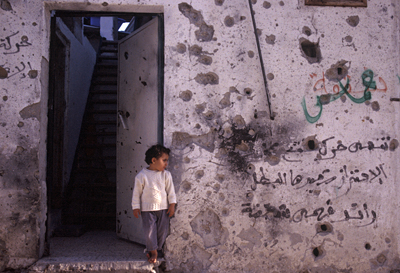
Gaza, 2002: A young Palestinian child in Rafah stands in her home,
the site of a massacre several weeks earlier.
Photo: Darren Ell
|
 Gaza, 2002: A young Palestinian child in Rafah stands in her home, the site of a massacre several weeks earlier. Photo: Darren Ell |
Sara 'Adwan, Rafah camp, April 9:
|
|
I want to record with working women as well as mothers, and that's how I get to meet Sara 'Adwan. She's from the same family and village as Andalib, the friend who brought me to Rafah. Umm Muhammad Shahada also knows her - they are distantly related, and like Umm Muhammad, Sara's family has come back to Rafah via 'Canada camp'. Umm Muhammad offers to guide me to the new home Sara's brothers are building.
Because it's A'eed al-Adhar, we find Sara at home not at school (she's a teacher). The Israelis blew up their home in Rafah in 1973, forced them into Sinai. A Fateh member, Sara worked with the PLO for many years in different parts of the menfah (exile). Her current job - supposedly a reward for years of loyal service - is teaching in a government elementary school. The pay is low and the hours are long. She has to stand up to teach, though years of hard work have left her with painfully swollen legs. Life stories are always coloured by the concerns of the moment, and Sara speaks less of her past life than of her present discontents. These are mainly two and they are entwined: her dissatisfaction with the National Authority for its failure to achieve national demands; and her sense of having been unfairly treated. Her legs require medical treatment, and the job she occupies |
is unworthy of her qualifications and the sacrifices she has made for the national movement. Before Oslo, there had been the sense that all were equal in the national struggle. Abu Ammar had seemed equally accessible to all. After Oslo, with state-building, a pecking order appeared: some got well-paid jobs in Ministries and VIP privileges, others did not.
Displacement again - but of a subtler kind. As member of a revolutionary movement in exile, Sara found a role and a 'place'. Returned to her birth-place Rafah, instead of feeling 'at home' she feels doubly displaced, on both the family and national levels. With Oslo, exile is supposedly over, yet several of her family are still stuck in 'Canada camp' (her father had to be buried there when he died, the Israelis wouldn't allow his body to be taken to Rafah for burial). Rafah camp has changed too, and the relationships built in exile have shifted from ones of equality to ones of patronage and hierarchy. Sara sums it up in a bitter phrase 'Al-ghourba hina' ('Exile is here', ie. at home).
Sara 'Adwan begins her story: |
[Umm Muhammad Shahada] ['Umm Faris'] Copyright©2005 |
|